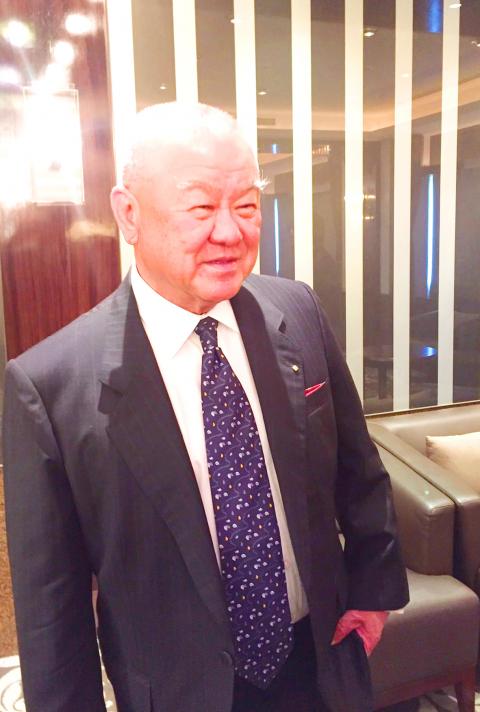Taiwanese companies and organizations yesterday conveyed a range of responses to a potential trade war between the US and China.
US President Donald Trump on Thursday signed a memorandum to impose tariffs on Chinese imports and restrictions on Chinese investments.
Less than 12 hours later, China proposed a retaliatory list of potential tariffs on US imports.

Photo: CNA
Up to 30 percent of Taiwanese industries process their goods in China before export to the US, Chinese National Association of Industry and Commerce (工商協進會) chairman Lin Por-fong (林伯豐) said.
He predicted that the textile, e-commerce, machining and machine parts industries would be affected.
On the surface, the tariffs target Chinese manufacturers, but many Taiwanese firms would also be affected because of their investments or factories in China, Chung-hua Institution for Economic Research president Wu Chung-shu (吳中書) said.
As Taiwanese firms expand overseas, they should consider not only the current situation, but also a potential global trade war, he said.
SEMI Taiwan president Terry Tsao (曹世綸) said he does not want to see an obstacle to global trade cause the semiconductor sector’s upstream, midstream and downstream industries to divide their work around the world.
At the moment, the tariffs will likely have a larger effect on the downstream industry, Tsao said, adding that it is too soon to see effects on the upstream industry.
Taiwan Semiconductor Manufacturing Co (台積電) said that as its production base is in Taiwan, its operations would not be affected.
A US-China trade war might have a negative effect on global economic development, but to what extent cannot be addressed at the moment, United Microelectronics Corp (聯電) said.
The technology industry has global supply chains, Delta Electronics Inc (台達電) said, adding that as many of its main clients are US or European, there would be no direct impact.
Generally speaking, a US-China trade war would only affect the US market of the notebook computer industry, particularly brands with a large market share in the US, a source in the industry said on condition of anonymity.
In the fourth quarter of last year, HP Inc held a 33.7 percent share of the US PC market, followed by Dell at 24.3 percent, Apple Inc with 13 percent, China-based Lenovo Group (聯想) at 11.8 percent and Taiwanese firm Acer Inc (宏碁) with 3.9 percent, market researcher Gartner Inc statistics showed.
Acer yesterday said it still needs to assess the effects of the tariffs.

The CIA has a message for Chinese government officials worried about their place in Chinese President Xi Jinping’s (習近平) government: Come work with us. The agency released two Mandarin-language videos on social media on Thursday inviting disgruntled officials to contact the CIA. The recruitment videos posted on YouTube and X racked up more than 5 million views combined in their first day. The outreach comes as CIA Director John Ratcliffe has vowed to boost the agency’s use of intelligence from human sources and its focus on China, which has recently targeted US officials with its own espionage operations. The videos are “aimed at

STEADFAST FRIEND: The bills encourage increased Taiwan-US engagement and address China’s distortion of UN Resolution 2758 to isolate Taiwan internationally The Presidential Office yesterday thanked the US House of Representatives for unanimously passing two Taiwan-related bills highlighting its solid support for Taiwan’s democracy and global participation, and for deepening bilateral relations. One of the bills, the Taiwan Assurance Implementation Act, requires the US Department of State to periodically review its guidelines for engagement with Taiwan, and report to the US Congress on the guidelines and plans to lift self-imposed limitations on US-Taiwan engagement. The other bill is the Taiwan International Solidarity Act, which clarifies that UN Resolution 2758 does not address the issue of the representation of Taiwan or its people in

US Indo-Pacific Commander Admiral Samuel Paparo on Friday expressed concern over the rate at which China is diversifying its military exercises, the Financial Times (FT) reported on Saturday. “The rates of change on the depth and breadth of their exercises is the one non-linear effect that I’ve seen in the last year that wakes me up at night or keeps me up at night,” Paparo was quoted by FT as saying while attending the annual Sedona Forum at the McCain Institute in Arizona. Paparo also expressed concern over the speed with which China was expanding its military. While the US

SHIFT: Taiwan’s better-than-expected first-quarter GDP and signs of weakness in the US have driven global capital back to emerging markets, the central bank head said The central bank yesterday blamed market speculation for the steep rise in the local currency, and urged exporters and financial institutions to stay calm and stop panic sell-offs to avoid hurting their own profitability. The nation’s top monetary policymaker said that it would step in, if necessary, to maintain order and stability in the foreign exchange market. The remarks came as the NT dollar yesterday closed up NT$0.919 to NT$30.145 against the US dollar in Taipei trading, after rising as high as NT$29.59 in intraday trading. The local currency has surged 5.85 percent against the greenback over the past two sessions, central